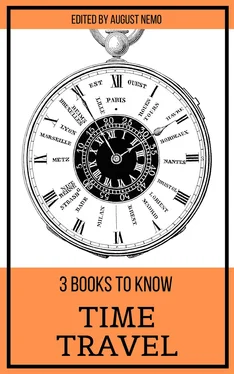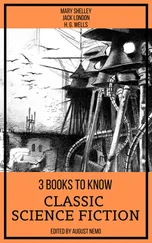“No, no!” cried I; “none of those men could ever have foreseen the ultimate beneficial results of these discoveries of natural truths.”
“You are perfectly right in your remarks,” said Bacon, as I paused. “From my own personal knowledge of what has come to pass in the field of industry during the last two centuries, I could adduce a good many more examples to show that many of your nineteenth-century discoveries, which for a long time afterwards merely bore a purely scientific significance or character, have now become prolific sources of material benefit to society at large. Nor does any one now-a-days doubt the importance of pure science; all governments look upon it as an urgent duty on their part to promote the same wherever they can; nor is it too anxiously asked whether it does bear, in every instance, immediate results to benefit the material condition of society. Moreover, it should not be here forgotten that every man of judgment and discrimination has long since learned to see that the furtherance of material advantages as the aim and end of human endeavours is an idea as narrow in itself as it is unworthy of rational beings. Surely there exists another and infinitely higher mainspring of happiness in the enjoyment of gathering such knowledge as will enable us to perceive the causal connection between the phenomena of nature, or teach us the history of man and all his surroundings. The pursuit of material gratification is essentially a thing which man shares with the brute; but our desire to ennoble that which is spiritual or immaterial in us—that is exclusively human; the gratification of such desire is the genuine ‘trade-mark’ of real civilization. So much is the bulk of modern society already convinced of these truths, that no government could now-a-days afford to neglect the encouragement of scientific pursuit, although the utmost discretion be left to the men of science themselves with regard to the other question: how and in what direction the extension of knowledge ought to take place.”
“Then you hear nothing more now of what was once termed ‘official science’?”
“I really do not know,” said Bacon, “what you are alluding to; but if you use the word ‘official’ in its usual acceptation—meaning that which can no longer be doubted, since it emanated from a responsible government—then, my dear sir, you will pardon me the remark that the expression is anything but felicitous, nay, very shallow indeed. A government may protect, support, and promote science, but it can never stamp it with the seal of genuineness. Such seal is held by truth alone!”
Somewhat ashamed of my apparently antiquated notions and childish observations, I walked on in silence until Miss Phantasia all of a sudden exclaimed: “Here we have actually got to the exhibition of
––––––––
OH, do let us go in. I should very much like to know whether they come at all up to those enormous golden placards outside, and whether the highest of the fine arts is here equalled by reality.”
There was something spiteful in the remarks of the young lady; and at my question of what was meant by heliochromes, she again sarcastically replied, “Oh! nothing but photographs in the natural colours of the objects as pencilled by the sun himself; so, at least, in her extravagant style, says my friend Realia.”
“Ha!” exclaimed I, “the ultimate triumph of the life-long endeavours of that plucky Frenchman, De Saint-Victor! final fruits of the prix Trémont awarded him by the French Academy!”
Bacon looked at me with a smile clearly indicative of his contempt for my helpless ignorance. But all he said was this: “Come inside, please, and you will have something else to see than those rude and perishable experiments of Victor of the nineteenth century.”
We entered, and I could not trust my eyes. The walls of the building were covered with innumerable pictures, landscapes, portraits, and genre-pieces, some of the figures life-size; and all these pictures were mere photographs, yet photographs differing as much from those that I was familiar with as an oil painting does from a crayon drawing.
“Unhappy artists! poor arts!” I exclaimed; “what have you come to at last?”
But Miss Phantasia appeared to share my delight no more than my sympathy. “Unhappy artists, indeed,” was her reply, “if by such honourable name you designate those knights of the brush whose sole aim and end is the faithful imitation of reality; but do not say poor arts! They have by no means died out, the worthy successors of Raphael and Corregio, of Rubens and Rembrandt, of those whose calling was not to imitate nature, but to idealise it. And that is the vocation of art. Simple imitation is mere handicraft. And although the monuments and statues of living persons are now mechanically taken from photographs, aye, by a common workman who has no notion of art; yet have we sculptors who are genuine artists, creators of the ideal.”
I quietly accepted the rebuff, and rejoiced to think that all those treasures of art of which my country is so proud had not then, after all, deteriorated in worth; on the other hand, it was to me a matter of little moment that mediocre talents, incapable of rising above the imitation of reality, had been compelled to exchange the brush for the camera obscura; and I had no doubt that their productions would thereby gain—in faithfulness.
As we left the exhibition building, I saw a huge waggon without any horses, but simply governed by one man, in spite of which it seemed to roll on as easily as possible, and to pull up at pleasure. The waggon was loaded with all sizes of black-coloured cylinders, resembling casks or barrels. I was perfectly aware of the numerous successful experiments made long ago in England and elsewhere with the construction of steam-engines destined to run, not along iron rails, but along the ordinary roads. I could not, however, help noticing that this waggon differed totally from those old locomobiles, inasmuch as there were no signs of steam about the novelty.
Once more I turned to my amiable guide for an explanation; but although he immediately prepared to comply with my request, still I am obliged to confess that not everything was quite clear to me. I imagine this was partly owing to Bacon’s making use of the names of engines and materials with which I was unfamiliar; but this is about what I understood him to say:
“So long as we had abundance of coal, the use of steam was found to be amply sufficient for the locomotion of all kinds of engines, waggons, or carriages; but about the beginning of this century the quantity of coal in the different countries of Europe had decreased to such an extent that the price of the article became by far too high for daily and ordinary use. True, the supply of North America was far from being exhausted; but, of course, the exportation from thence could not but influence the cost. The same inconvenience further presented itself with such engines where the locomotive power was produced by continually recurring explosions of a mixture of light-gas and common atmospheric air, since the cost of light-gas naturally increased with the decrease of coal, from which it was principally made. Under these circumstances, recourse was had to the electro-magnetic machines, which could not be used to advantage so long as coals were inexpensive; now, however, these were not only able to compete with the different kinds of steam-engines, but they had this advantage over the latter, that they were entirely free from the danger of explosive boilers.
“Nevertheless the electro-magnetic power, with all its improvements, was, and remained, a more expensive one than that formerly produced through coal, and the consequence of this was a decrease in the produce of a great many things which had not only grown into matters of daily necessity, but even into a sine quâ non of a progressive and lasting civilization.
Читать дальше












